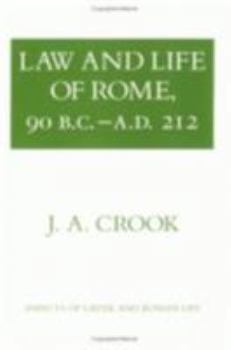Law and Life of Rome, 90 B.C.-A.D. 212
(Part of the Aspects of Greek & Roman Life Series)
Select Format
Select Condition 
Book Overview
No Synopsis Available.
Format:Paperback
Language:English
ISBN:0801492734
ISBN13:9780801492730
Release Date:July 1984
Publisher:Cornell University Press
Length:352 Pages
Weight:0.40 lbs.
Dimensions:0.9" x 5.4" x 8.5"
Age Range:18 years and up
Grade Range:Postsecondary and higher
Customer Reviews
2 ratings
Sex, Lies, and Intestate Succession
Published by Thriftbooks.com User , 19 years ago
Easy to understand but impressive in its control and use of detailed information. The facts here are monstrously complex, but Crook is equally masterful at narrative and analysis. The emphasis is on civil rather than criminal law.
Legal History
Published by Thriftbooks.com User , 22 years ago
It would be pretty tough to argue that this isn't a great book. J.A. Crook provides a very through overview of Roman law and procedure from roughly 90 B.C.E. to 212 C.E. Under such rubrics as commerce, labor, and status, Crook explains in minute detail the workings of law as it related to society and social relations. Beware, this is specialized Roman history. A beginner could be in trouble if he is not aware of at least a basic outline of Roman history and society.Most of what historians and scholars know about Roman law comes second hand through manuscripts of the day (Cicero, etc.). A big source for law in this period comes from Justinian's Digests, a massive compilation of law sources written in the 6th century C.E. The jurists who compiled this massive collection did so on the fly, so to speak, so it does leave much to be desired. There is also the problem that the Digests were compiled four to six centuries after the period in question. Other sources include works by Gaius, inscriptions found on tombs and in places such as Pompeii, and papyrus collections found in Egypt. At worst, so much is missing. At best, what we do have often has to be read between the lines in order to make connections to early Rome. Of course, this has never stopped scholars from doing their best to earn their PhDs.Crook can be frustrating. His descriptions of status in the Roman world boggle the mind, although patient reading and knowledge certainly help to make the distinctions. The Romans were nuts for status, and it shows. What is a Junian Latin and what does that status mean? What were the rights of a citizen? It's all here in this book. What quickly becomes apparent is the complexity of this ancient society. Just like today, there are lots of examples of laws that were enacted and then subtly modified as new circumstances emerged. One of the most interesting sections in the book is the description of how civil courts worked. Legal actions took place in private homes and businesses, not a courthouse. The ensuing process was quite complicated, with a praetor deciding whether an action existed and a judge deciding what the outcome would be. Most of the figures involved, including the magistrate and judge, knew little law themselves. They could rely on jurists for advice, but seemed to rely more on "good sense." Only with the appearance of the Principate could appeals be made (to the emperor). There are also some good stories here that will induce a chuckle or two. I particularly liked the story about the slave that got his throat cut while receiving a shave from the barber. Barbers worked outside, and someone was playing ball in the street. The ball hit the barber's hand and caused a nasty slip. The mental image still makes me laugh. Also, a series of legal actions revolved around things that were thrown or dropped into the street by people living in the "high rises" in Rome.This is an excellent book, and very illuminating. Knowledge of Latin would be very helpful





